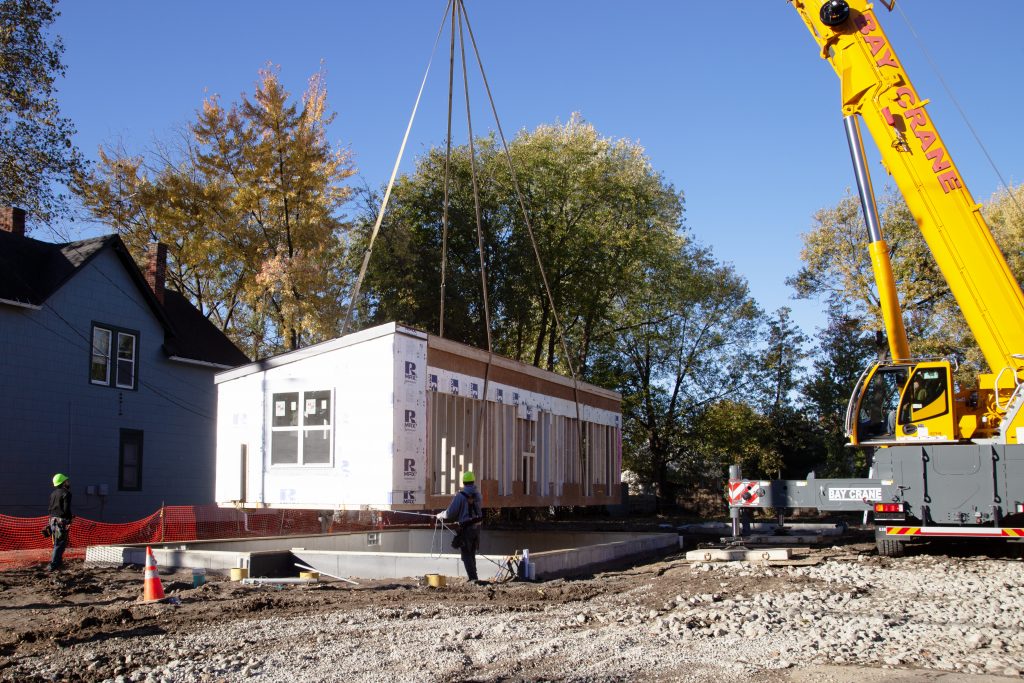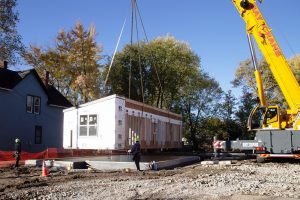Partnerships Speed Availability of Affordable Housing in Cleveland


Greater Cleveland’s Habitat for Humanity – in partnership with Cuyahoga Land Bank and Cleveland City Council – is piloting a modular housing program aimed at speeding up the availability of affordable single-family homes.
The Cleveland area, despite a recent national housing market slowdown, has continued to see steady increases in home sales and uptick in home values.
A Redfin report found that in Cuyahoga County home prices jumped 11% in the last year. And according to RentCafe, Cleveland saw a 26% increase in both rental searches and demand in 2024.
The strong housing market is good news for sellers, but rising home prices coupled with housing stock shortages causes affordable issues for renters, longtime residents in aging homes and first-time home buyers looking to buy into an affordable neighborhood.
Seniors looking to age-in-place in legacy neighborhoods are particularly vulnerable Ward 14 Councilwoman Jasmin Santana explains.
“I have only about 40% owner-occupancy in my Ward,” Santana said. “The goal is to increase that owner occupancy number and have more families, own their own home and be able to stay in their neighborhood.”
Traditionally adding more housing to meet demand lowers overall housing costs but Santana said the market-rate for new construction remains too expensive for her Clark-Fulton residents.
“We know that there’s still a high cost to build homes in our area. I wanted to see if we would be able to get more for our dollars with modular homes,” Santana said.
In late October, the first 1,494-square-foot, three-bedroom, energy-efficient ranch-style modular home touched down at 3157 Walton Avenue using $10 million in federal American Rescue Plan Act (ARPA) dollars managed by the Land Bank.
The decision to use modular homes for half of her eight total housing projects came after Santana and Habitat reached out to Clark-Fulton residents.
“We made a point to reach out to understand the prospective homeowner’s wants and needs,” Habitat’s Bob Whitney said.
“The majority said they want somewhere they can stay long term. We wanted homes people could get older in without needing to leave. That’s why we’re only building aging-in-place homes with first-floor bedrooms, bathrooms, washer and dryer access, and even grab bars for accessibility.”
A total of four modular homes sites is slated for in and around the Clark-Fulton neighborhood, which hasn’t seen development in decades, Santana said. The homes will be sold at a below market rate but yet-to-be-determined price point to buyers selected by Habitat.
One of the appeals of modular home construction is that because they are assembled in an offsite factory and transported to prepared sites, an estimated 20-30% savings is shown in building supply, labor and site security costs.
Whether that savings is realized, Whitney said the 30-50% shorter construction timeline is enough of an argument to make the modular housing model the right option for Ward 14.
The construction, he explains, is not affected by weather delays and the site can be prepared at the same the home is being built.
For the pilot, professional builders are contracted to finish the two separate modules of the home. Those crews also handle appliances and utilities hook up but the period from contract to move-in is eight to 12 weeks compared to the 18-24 months with traditional construction.
To make the home more affordable, buyers will be able to access Habitat’s 0% down, 0% mortgage rate and sweat equity financing program. Also, the energy-efficient construction means lower utility costs and the houses are eligible for a 100%, 15-year tax abatement.
The city could see higher cost and timelines savings, if Cleveland’s plan to bring modular construction company a 20-acre site in Collinwood, where the former General Electric plant was located. It’s set aside $50 million in federal funds and issued an RFP in hopes that a modular manufacturer sets up shop in Cleveland to help address the city’s 15,000-unit housing shortage.
For now, Habitat will continue to work with city council to fill in the affordable housing gaps and partner with the Land Bank’s Legacy Communities Revitalization Program to help existing homeowners in proximity to the new modular construction pay for home repairs.